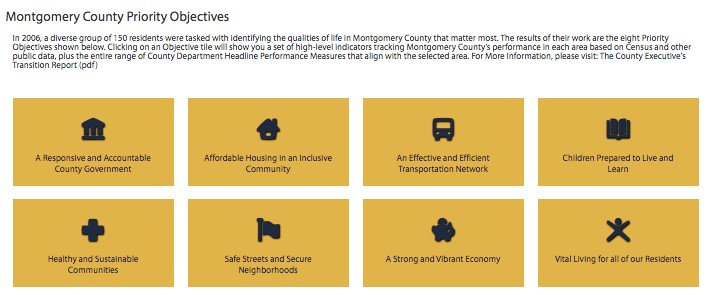Connecting state and local government leaders
What are the lessons learned and what are we still learning about performance and evidence-based management in government?
A few weeks ago, I had the opportunity to talk with chief administrative officers from local governments in the Metropolitan Washington Council of Governments (MWCOG). I wanted to talk about lessons learned and those we still need to learn about performance and evidence-based management in government, by which I mean government’s use and communication of goals, measurement, analysis, well-designed evaluations, other occasional studies, data-rich discussions (“Stat” meetings, etc.), and well-structured incentives to deliver more effective, efficient, fair, understandable, and trusted government. I wanted to reflect with this group because so many of them have long been pioneers in these practices.
Prior to this conversation, I visited several MWCOG websites. Every community did a great job facilitating online citizen access to government services. Few, however, made it easy to find what their government was trying to accomplish, why, how, and how well.
Those that did, however, offer valuable lessons. Check out, for example, Montgomery County’s CountyStat. It starts by succinctly laying out countywide priority objectives.

Clicking on a tile takes you to information about progress, factors affecting progress, and strategies being used to improve performance. Specifically, you find a color-coded suite of countywide and departmental indicators with icons indicating whether or not they are trending in the right direction. Contextual indicators the county does not influence but that aid accurate interpretation of other indicators are also shown. Each indicator’s “Detail” button leads to comparative trend graphs benchmarking how Montgomery County fares relative to other communities, the region, and the nation.
In addition, the CountyStat site features:
Cross-departmental Initiatives
Public dashboards support a small number of cross-departmental efforts that require attention, knowledge, skills, and resources from multiple parties in and beyond County government. Still under development, the site integrates information from and will support collaboration across government departments and non-governmental organizations.
Departmental Indicators
Every department reports on its supports for countywide priorities, its mission, what it does and for whom, its divisions, budget, and headcount. Major departments report key performance indicators in two categories: (1) Headline and (2) Responsive and Sustainable Leadership.
- Headline Indicators: Each department explains why the indicators are important, factors contributing to performance, factors restricting performance, and plans for improvement.
- Responsive and Sustainable Leadership Indicators: Each department reports the indicators it tracks to assure its capacity to move Headline Indicators. These might, for example, include overtime, workplace injury, succession planning, environmental, and internal audit metrics.
CountyStat links easily to dataMontgomery, budgetMontgomery, spendingMontgomery, and dates of CountyStat meetings.
Fairfax County takes a very different approach. It, too, focuses on a small number of initiatives, explaining why each is important, plans, and progress for initiatives far enough along. Fairfax tracks 400 lines of business (LOB), some directly affecting residents (e.g., lifelong learning for adults) and some “back-office” functions (e.g., mail services.) The department leading each LOB is clearly identified and a department-specific slide deck describes its objectives, LOBs supported, strategies, progress, and future plans. (See, for example, the library’s).
Also of note is a cross-jurisdiction effort by Fairfax County and the City of Fall River to address a shared problem: homelessness. Together, they publicly report overall trends and trends for different sub-groups. For each sub-group, characteristics that might affect program design and success are described. In addition, the site supports a campaign to enlist public assistance to make progress on this goal.
The different ways MWCOG communities report performance got me asking: why do governments report performance and should every government do it? The President’s FY2011 Budget chapter on high-performing government (Analytical Perspectives Ch. 7, Reason 2) suggests a set of objectives for government performance reporting. Government performance reporting unquestionably helps interested governments learn from others’ experience. Looking at other governments’ public performance reporting certainly helped me formulate performance management recommendations for the incoming Presidential Administration eight years ago and subsequently informed design of federal government performance management practices and Performance.gov. Beyond that, timely public performance reporting may be an effective motivator and mechanism to build accountability and build trust. It also likely supports purpose-focused, cross-organization implementation. Still, with so much experience under our belts, let me suggest it is time to consider more objectively and rigorously the purpose of and evidence about public performance reporting.
Also, in reviewing MWCOG websites, I found myself creating an informal assessment checklist. Could I find a government’s objectives and did its objectives make sense? Could I see trends on those objectives, strategies used, planned next steps, and why each was chosen? Could I understand what I was seeing and was it still relevant?
It got me wondering: would governments and good-government advocates find such a checklist useful? Also, could we crowd-source not just a performance reporting checklist but, possibly, constructive feedback? While clarifying the objectives of public performance reporting, let me suggest we also start to ask and answer these questions.
Shelley H. Metzenbaum is senior advisor at the Volcker Alliance. She served as associate director for performance and personnel management at the Office of Management and Budget during the first term of the Obama administration.

NEXT STORY: Where Did Federal Funds for Cover Oregon Go?; N.C. May End Border Dispute With S.C.



